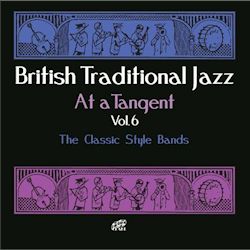Mike Daniels and his Delta Jazzmen
Kater Street Rag
Weary Way Blues
Snake Rag
Candy Lips
Cannonball Blues
Steve Lane & His Famous Southern Stompers
Streamline Train
The Pearls
Dr Jazz
A Good Man Is Hard to Find
Gate Mouth
Colin Kingwell's Jazz Bandits
The Hottest Man in Town
You Don't Understand
Alabama Tickle
Seattle Hunch
Loose Livin' Stomp
The Dolphin Jazz Band
Here Comes the Hot Tamale Man
Beale Street Blues
Ian Bell's Jazzmen
Louisiana
The Original Downtown Syncopators
Clarinet Marmalade
Alligator Hop
Shimme Sha Wabble
The Temperance Seven
My Momma's in Town
Tiger Rag (Kaiser Drag)
recorded 1951-63
LAKE LACD335
[74:03]
Volume 6 in this ever-expanding series – how long will it be? – takes in the ‘Classic Style Bands’ - which is to say, something that settles around the
King Oliver-Jelly Roll Morton axis and takes in Chicago of the 1920s, both black and white, as well as the Original Dixieland Jazz Band. That’s quite a
wide stylistic area and it ensures that this volume has plenty of latitude from the seven bands concerned. The recordings date from 1951 to 1963.
The earliest tracks are rare acetates from Mike Daniels and his Delta Jazzmen and offer solid classic fare in terms of repertoire, as well as instrumental
competence and spirited drive. Even then ensemble work was a strength of the band with the leader’s firm lead and Ian Armit’s useful piano playing definite
strengths. A solid ensemble player, trombonist Pete Hodge is inclined to be too much on the beat in his soloing. Two years later things were changing.
Gordon Blundy had replaced Hodge, Ian Wheeler was on board, and so too was the great Fred Hunt who takes a solo on Jelly Roll’s Cannonball Blues
in which the leader sounds decidedly King Oliver-like. The banjo is strongly prominent on the 1960-62 tracks by Steve Lane and his Famous Southern
Stompers. Streamline Train is a longish track with shifting lead – cleverly done – and they capture Morton’s ethos well on The Pearls in
particular. The brass bass, unfortunately, hampers Dr Jazz. Pam White, in thrall to Bessie Smith, sings with the band on A Good Man Is Hard To Find though this track sounds too much like pastiche.
The saucily-named Colin Kingswell’s Jazz Bandits are represented by five tracks from 1961-62. They cultivate a good ensemble sound and have on board
drummer Ted Wood, brother of the more famous Ronnie, of the Rolling Stones. Not a great singer, he keeps solid time. The band takes on good repertoire and
makes something of Jelly’s piano solo recording of Seattle Hunch, showing how it can be transformed into a band number. We also hear from The
Dolphin Jazz Band, not well-remembered, in two tracks from April 1962. Pianist Jon Collinson was over-recorded but this Territory Band goes back to the
1920s reasonably well. Ian Bell’s Jazzmen made very few records and we have just the one here – Louisiana. Ben Cohen is the assured cornet lead.
There are three tracks courtesy of The Original Downtown Syncopators (June 1963) whose faithful if strangely bizarre ODJB archaisms are interesting to
hear. For bands in the year of the Beatles’ first LP to be pouring out Larry Shields-inspired clarinet may seem odd now, but it was clearly a labour of
love at the time. And remember that Billy Jones, the English pianist who depped with – and recorded with – the ODJB in 1920 in London was still very much
alive. (There’s a fascinating documentary film of him from British Pathé and available on YouTube, though he doesn’t speak.) Finally, the Temperance Seven
and a brace of roistering numbers, of which the humorous trumpet solo in My Momma’s in Town has the whiff of cod about it.
There’s plenty here to interest wide traditional palettes, therefore, and in commendably good sound. Some of the acetates must have been tricky to restore
but you’ll enjoy the results.
Jonathan Woolf
